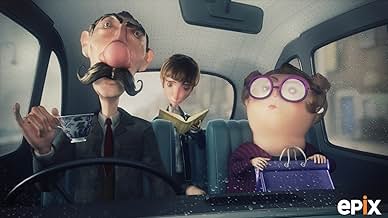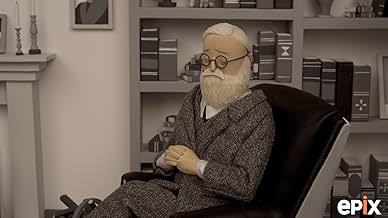CALIFICACIÓN DE IMDb
5.8/10
1.9 k
TU CALIFICACIÓN
Agrega una trama en tu idiomaAn animated, factually incorrect biography of Graham Arthur Chapman, one of the founding members of the comedy group Monty Python.An animated, factually incorrect biography of Graham Arthur Chapman, one of the founding members of the comedy group Monty Python.An animated, factually incorrect biography of Graham Arthur Chapman, one of the founding members of the comedy group Monty Python.
- Dirección
- Guionistas
- Elenco
John Cleese
- John Cleese
- (voz)
- …
Terry Jones
- Terry Jones
- (voz)
- …
Carol Cleveland
- Masseuse
- (voz)
- …
Ronnie Corbett
- Thompson
- (material de archivo)
- (sin créditos)
David Frost
- Self
- (material de archivo)
- (sin créditos)
- Dirección
- Guionistas
- Todo el elenco y el equipo
- Producción, taquilla y más en IMDbPro
Opiniones destacadas
Graham Chapman was erratic, flamboyant and, so close friends attest, somewhat unknowable. Before his death in 1989, The comic and Monty Python member completed a bizarre book full of his singular humour, formative experiences recounted in typically skewed fashion, surreal fabrications, and hints towards his struggle with alcohol (he was known to drink several pints of gin daily).
As animation producer Justin Weyers disclosed during the aforementioned workshop, the production team, headed by directors Bill Jones, Jeff Simpson and Ben Timlett, required a certain scope and diverse approach to do justice to the subject matter. What resulted is a patchwork of various animation methods from fourteen different creative teams, helped along the way by vocal contributions from the Pythons, and sewn together with occasional film and interview clips.
The film leaps briskly between animation methods, including cell techniques and stop motion, all converted into stereoscopic 3D. This may sound a jarring and disparate visual style, and it sometimes is. But the piece is helped enormously by the audio narration Chapman recorded of his book, which ties the threads together and drives the whole thing along. There is a clear standout aesthetic, achieved by oil painting every frame onto glass. Wielding rich, textured results, this visual style illustrates the darkest portion of the film, concerning Chapman's attempts to confront his alcoholism. These scenes were so striking it's almost a shame when the section utilising this method drew to a close, other animation styles seeming comparatively flat.
Other highlights arrive in the form of recounted Python meetings in which the comics are for some reason reimagined as monkeys, comically graphic sex scenes, and surreal flights which variously find the comedian wandering around space, and sipping spirits with the Queen. There's an evident attention to craft throughout.
As to be expected from this sort of project, there are sections which don't work as well as others. A stern talking to from a stop motion Sigmund Freud, voiced by Cameron Diaz (who else), is a disappointingly dry episode. On the whole, this is a camp and absurd, sensitively crafted film, at turns irritating, but ceaselessly creative; a fitting tribute to an unpredictable, distinct talent.
www.theframeloop.com
As animation producer Justin Weyers disclosed during the aforementioned workshop, the production team, headed by directors Bill Jones, Jeff Simpson and Ben Timlett, required a certain scope and diverse approach to do justice to the subject matter. What resulted is a patchwork of various animation methods from fourteen different creative teams, helped along the way by vocal contributions from the Pythons, and sewn together with occasional film and interview clips.
The film leaps briskly between animation methods, including cell techniques and stop motion, all converted into stereoscopic 3D. This may sound a jarring and disparate visual style, and it sometimes is. But the piece is helped enormously by the audio narration Chapman recorded of his book, which ties the threads together and drives the whole thing along. There is a clear standout aesthetic, achieved by oil painting every frame onto glass. Wielding rich, textured results, this visual style illustrates the darkest portion of the film, concerning Chapman's attempts to confront his alcoholism. These scenes were so striking it's almost a shame when the section utilising this method drew to a close, other animation styles seeming comparatively flat.
Other highlights arrive in the form of recounted Python meetings in which the comics are for some reason reimagined as monkeys, comically graphic sex scenes, and surreal flights which variously find the comedian wandering around space, and sipping spirits with the Queen. There's an evident attention to craft throughout.
As to be expected from this sort of project, there are sections which don't work as well as others. A stern talking to from a stop motion Sigmund Freud, voiced by Cameron Diaz (who else), is a disappointingly dry episode. On the whole, this is a camp and absurd, sensitively crafted film, at turns irritating, but ceaselessly creative; a fitting tribute to an unpredictable, distinct talent.
www.theframeloop.com
This is a very naughty movie. Many times I said to myself, "Did I just see what I thought I just saw? No, it couldn't be." It celebrates anuses, penises, anal sex, 69, promiscuity, alcoholism and death. The animation is very cleverly done to give you the subjective impression of seeing the world from inside Graham Chapman's head. Everything just sort of flows, the way ideas flow.
There is one big catchy musical number with words that summarises the cheeky raunchiness:
Sit on my face and tell me that you love me
I'll sit on your face and tell you I love you too
I love to hear you oralize
When I'm between your thighs
You blow me away
Sit on my face and let my lips embrace you
I'll sit on your face and then I'll love you truly
Life can be fine if we both sixty nine
If we sit on our faces in all sorts of places
And play till we're blown away
There is one big catchy musical number with words that summarises the cheeky raunchiness:
Sit on my face and tell me that you love me
I'll sit on your face and tell you I love you too
I love to hear you oralize
When I'm between your thighs
You blow me away
Sit on my face and let my lips embrace you
I'll sit on your face and then I'll love you truly
Life can be fine if we both sixty nine
If we sit on our faces in all sorts of places
And play till we're blown away
Having just read the book days before watching the film i felt it was a fun and entertaining interpretation of Graham Chapman's zany autobiography. The animations were good (even if I liked some more than others) and even gave a better visual context to some of the parts in the book that i got a little lost on. The voice acting was enjoyable but the "Cameron Diaz as Freud" part ran a little long in my opinion. All in all I thought it was a pretty enjoyable and interesting endeavor.
Was this film put together by several committees? What a disappointing 'tribute' to a great talent! The animation styles were all over the place. Nothing cohesive. It was as if multiple committees of individuals, who never met, had decided to produce different parts of the film without consulting each other. It looks like multiple animation 'artists' were trying to show off their styles of animation without respect to the purpose of the film. What a visual mess! Such a disappointing 'tribute'(?!) to one of the greatest talents in British comedy. It is a disappointing example of 'style over content' A thoroughly disappointing film :-(
I'm a big fan of the Pythons but before watching this pretty much all I knew about Graham Chapman's life was that he was an alcoholic and gay. Sadly, after watching the film, that still seems to be pretty much all there was to him.
A series of animation teams take us through Chapman's life from birth to death and with varying degrees of success, all with Chapman's narration. The visuals are mostly good and help to keep interest but anyone looking for insight will be disappointed. A self-indulgent sequence about Chapman's drinking withdrawal covers well-trodden ground and the repeated jokes about penises and ejaculation soon wear thin. OK, he was gay - we get it! The directors make the mistake of trying to be Pythonesque but nearly all the gags fall flat, while the storytelling gets lost and the timeline muddled. Chapman was a great performer and writer, but you wouldn't know it from this, which moves his art largely to 3rd place behind alcohol and being gay. A writing trip with Cleese seems happy to say Cleese did all the hard work on their projects while the sort of roles that gave Chapman the Hollywood lifestyle are brushed over.
Perhaps a better approach would have been to include archive footage and new materials, to explain things and provide context and perspective. Ultimately, this is just an unsatisfying film from some well-meaning Python fanboys.
A series of animation teams take us through Chapman's life from birth to death and with varying degrees of success, all with Chapman's narration. The visuals are mostly good and help to keep interest but anyone looking for insight will be disappointed. A self-indulgent sequence about Chapman's drinking withdrawal covers well-trodden ground and the repeated jokes about penises and ejaculation soon wear thin. OK, he was gay - we get it! The directors make the mistake of trying to be Pythonesque but nearly all the gags fall flat, while the storytelling gets lost and the timeline muddled. Chapman was a great performer and writer, but you wouldn't know it from this, which moves his art largely to 3rd place behind alcohol and being gay. A writing trip with Cleese seems happy to say Cleese did all the hard work on their projects while the sort of roles that gave Chapman the Hollywood lifestyle are brushed over.
Perhaps a better approach would have been to include archive footage and new materials, to explain things and provide context and perspective. Ultimately, this is just an unsatisfying film from some well-meaning Python fanboys.
¿Sabías que…?
- TriviaThe audio under the opening credits is from a sketch Chapman regularly used to perform, where he asked a live audience at the start of the show to give him "thirty seconds of abuse", as this saved time later on. For this movie, specially recorded abuse was added from John Cleese, Sir Michael Palin, Terry Jones (shouting Medieval curse words), Terry Gilliam, Carol Cleveland, and David Sherlock, Chapman's former partner. One of the investors in this movie can also be heard shouting "I want my f**king money back!"
- ErroresSigmund Freud's name is misspelled as "Seigmund Freud" in the opening title sequence and closing credits.
- ConexionesFeatured in De wereld draait door: Episode #8.126 (2013)
- Bandas sonoras633 Squadron
Written by Ron Goodwin
(P) EMI Partnership Ltd
Performed by Central Band of the Royal Air Force (as The Central Band of the RAF) with Principle Director of Music Wing Commander H. B. Hingley MBE
Produced by Roberto Danova
Supplied by kind permission of PLAZA Records Ltd
Selecciones populares
Inicia sesión para calificar y agrega a la lista de videos para obtener recomendaciones personalizadas
- How long is A Liar's Autobiography: The Untrue Story of Monty Python's Graham Chapman?Con tecnología de Alexa
Detalles
- Fecha de lanzamiento
- País de origen
- Sitios oficiales
- Idioma
- También se conoce como
- Graham Chapman: Dead in 3-D
- Productoras
- Ver más créditos de la compañía en IMDbPro
Taquilla
- Total en EE. UU. y Canadá
- USD 5,102
- Fin de semana de estreno en EE. UU. y Canadá
- USD 5,102
- 4 nov 2012
- Total a nivel mundial
- USD 63,469
- Tiempo de ejecución1 hora 25 minutos
- Color
- Relación de aspecto
- 1.85 : 1
Contribuir a esta página
Sugiere una edición o agrega el contenido que falta

Principales brechas de datos
By what name was A Liar's Autobiography: The Untrue Story of Monty Python's Graham Chapman (2012) officially released in India in English?
Responda




































